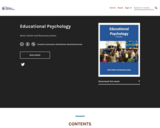
This textbook is an introduction to the psychology of education.
- Subject:
- Education
- Psychology
- Social Science
- Material Type:
- Textbook
- Provider:
- New Prairie Press Open Book Publishing
- Author:
- Kelvin Seifert
- Rosemary Sutton
- Date Added:
- 06/24/2021


This textbook is an introduction to the psychology of education.
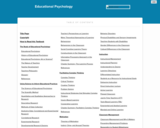
Textbook for Education Psychology course

This books lays the foundation for prospective teachers to learn about various teaching methodologies and covers material typically found in many teacher training programs. Chapters in the text can be assigned either from beginning to end, as with a conventional printed book, or they can be selected in some other sequence to meet the needs of particular students or classes. In general the first half of the book focuses on broader questions and principles taken from psychology per se, and the second half focuses on somewhat more practical issues of teaching. But the division between “theory” and “practice” is only approximate; all parts of the book draw on research, theory, and practical wisdom wherever appropriate. Chapter 2 is about learning theory, and Chapter 3 is about development; but as we point out, these topics overlap with each other as well as with the concerns of daily teaching. Chapter 4 is about several forms of student diversity (what might be called individual differences in another context), and Chapter 5 is about one form of diversity that has become prominent in schools recently—students with disabilities. Chapter 6 is about motivation, a topic that is heavily studied by psychological researchers, but that also poses perennial challenges to classroom teachers.
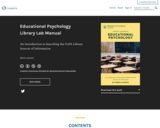
An Introduction to Searching the UofA Library Sources of Information
Short Description:
The manual’s purpose is to give students the foundational knowledge necessary to start searching for information in Educational Psychology using the University of Alberta Library’s catalog and databases. The manual contains step by step instructions, videos, and examples. The successful completion of the learning objectives will depend on spending sufficient time reading through the manual, answering the exercise questions, and reviewing the examples whenever necessary, which should take at least one hour and a half of uninterrupted time.
Word Count: 4730
(Note: This resource's metadata has been created automatically by reformatting and/or combining the information that the author initially provided as part of a bulk import process.)
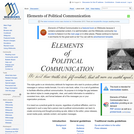
This style guide is an introductory wikibook for beginners who want to produce political messages in various media formats. It is not a rule book; rather, it is a set of guidelines to facilitate effective political communication. Its purpose is to bridge the gap between two distinct styles to create pragmatic, clear, and useful information to establish a consistent tone, style, and format between all of the messages you or your organization produces.
It is meant as a practical guide for anyone, regardless of political affiliation, and it is organized in such a way that a person new to political communication can learn to create convincing and thought-provoking op-eds, letters to the editor, press releases, social media posts, website content, and spoken messages.
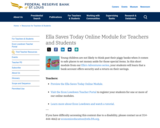
Young children are not likely to think past their piggy banks when it comes to safe places to set money aside for those special items. In this short course from our Ella's Adventures series, your students will learn that a bank account offers security and a return on their savings.

This course surveys the social, cultural, and political development of western Europe between 500 and 1350. A number of topics are incorporated into the broad chronological sweep of the course, including: the Germanic conquest of the ancient Mediterranean world; the rise of a distinct northern culture and the Carolingian Renaissance; the emergence of feudalism and the breakdown of political order; contact with the Byzantine and Islamic East and the Crusading movement; the quality of religious life; the vitality of the high medieval economy and culture; and the catastrophes of the fourteenth century.

This course is premised on the belief that emotions are a fundamental part of human nature. Accordingly, understanding emotions and incorporating emotions into our research can help us better explain variation in important political phenomena. Research on emotions and how emotions can influence decision-making has dramatically increased over the past two decades. This class aims to pick up on new findings from psychology and other disciplines and marshal this knowledge toward the most important issues of political science.

Word Count: 20993
(Note: This resource's metadata has been created automatically by reformatting and/or combining the information that the author initially provided as part of a bulk import process.)
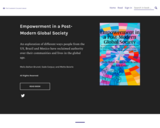
An exploration of different ways people from the US, Brazil and Mexico have reclaimed authority over their communities and lives in the global age.

This course will explore how Americans have confronted energy challenges since the end of World War II. Beginning in the 1970s, Americans worried about the supply of energy. As American production of oil declined, would the US be able to secure enough fuel to sustain their high consumption lifestyles? At the same time, Americans also began to fear the environmental side affects of energy use. Even if the US had enough fossil fuel, would its consumption be detrimental to health and safety? This class examines how Americans thought about these questions in the last half-century. We will consider the political, diplomatic, economic, cultural, and technological aspects of the energy crisis. Topics include nuclear power, suburbanization and the new car culture, the environmental movement and the challenges of clean energy, the Middle East and supply of oil, the energy crisis of the 1970s, and global warming.

This course examines the choices and constraints regarding sources and uses of energy by households, firms, and governments through a number of frameworks to describe and explain behavior at various levels of aggregation. Examples include a wide range of countries, scope, settings, and analytical approaches.
This course is one of many OCW Energy Courses, and it is a core subject in MIT’s undergraduate Energy Studies Minor. This Institute-wide program complements the deep expertise obtained in any major with a broad understanding of the interlinked realms of science, technology, and social sciences as they relate to energy and associated environmental challenges.
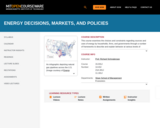
This course examines the choices and constraints regarding sources and uses of energy by households, firms, and governments through a number of frameworks to describe and explain behavior at various levels of aggregation. Examples include a wide range of countries, scope, settings, and analytical approaches. This course is one of many OCW Energy Courses, and it is a core subject in MIT’s underGraduate / Professional Energy Studies Minor. This Institute-wide program complements the deep expertise obtained in any major with a broad understanding of the interlinked realms of science, technology, and social sciences as they relate to energy and associated environmental challenges.
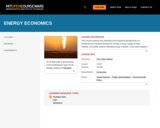
This course explores the theoretical and empirical perspectives on individual and industrial demand for energy, energy supply, energy markets, and public policies affecting energy markets. It discusses aspects of the oil, natural gas, electricity, and nuclear power sectors and examines energy tax, price regulation, deregulation, energy efficiency and policies for controlling emission.

This course explores the theoretical and empirical perspectives on individual and industrial demand for energy, energy supply, energy markets, and public policies affecting energy markets. It discusses aspects of the oil, natural gas, electricity, and nuclear power sectors and examines energy tax, price regulation, deregulation, energy efficiency and policies for controlling emission.

With increasing public awareness of the multiple effects of global environmental change, the terms water, energy, and food crisis have become widely used in scientific and political debates on sustainable development and environmental policy. Although each of these crises has distinct drivers and consequences, providing sustainable supplies of water, energy, and food are deeply interrelated challenges and require a profound understanding of the political, socioeconomic, and cultural factors that have historically shaped these interrelations at a local and global scale.
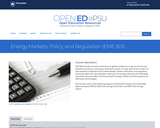
EME 801 provides a broad introduction to global markets for crude oil and refined petroleum products, natural gas, and electric power. A major goal of the course is to help students understand how market design, market institutions, and regulatory structures affect firm-level decision-making in the energy industries and ultimately, how these decisions affect the functioning of energy markets and the prospects for alternative technologies.

Understanding the energy needs and market opportunities in the specific off-grid community or region is the first step for effectively selecting and implementing the solutions to meet a community’s energy needs. MIT D-Lab has developed the Energy Assessment Toolkit to guide organizations through the process of gathering the information needed to make informed decisions about what technologies and business models are best suited to meet the specific needs of their community through market-based initiatives.
This toolkit is designed for any organization that has an on-the-ground presence in an off-grid community or region and has the ability to take action based on the opportunities identified. This community-based assessment approach is not intended to replace studies that track energy access on a national level or to generate market intelligence reports for external organizations looking to expand their business or programs into new markets.
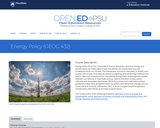
Energy policy sits at the crossroads of science and policy. And now, energy and climate policy are inextricably linked; the policies we choose have very real consequences for our climate. This intersection of science and policy is chaotic and bustles with activity motivated by various competing (and conflicting) interests and factors. We must understand the motivations driving them and bridge the divides between our reliance on fossil fuels and our need to transition to less carbon-intensive and renewable alternatives. While the science and math behind these problems is often fairly straightforward, the politics and behavioral changes are not. Come stand at this busy intersection with us as we navigate toward progressive climate policy alternatives at all scales of governance!
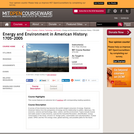
A survey of how America has become the world's largest consumer of energy. Explores American history from the perspective of energy and its relationship to politics, diplomacy, the economy, science and technology, labor, culture, and the environment. Topics include muscle and water power in early America, coal and the Industrial Revolution, electrification, energy consumption in the home, oil and US foreign policy, automobiles and suburbanization, nuclear power, OPEC and the 70's energy crisis, global warming, and possible paths for the future.